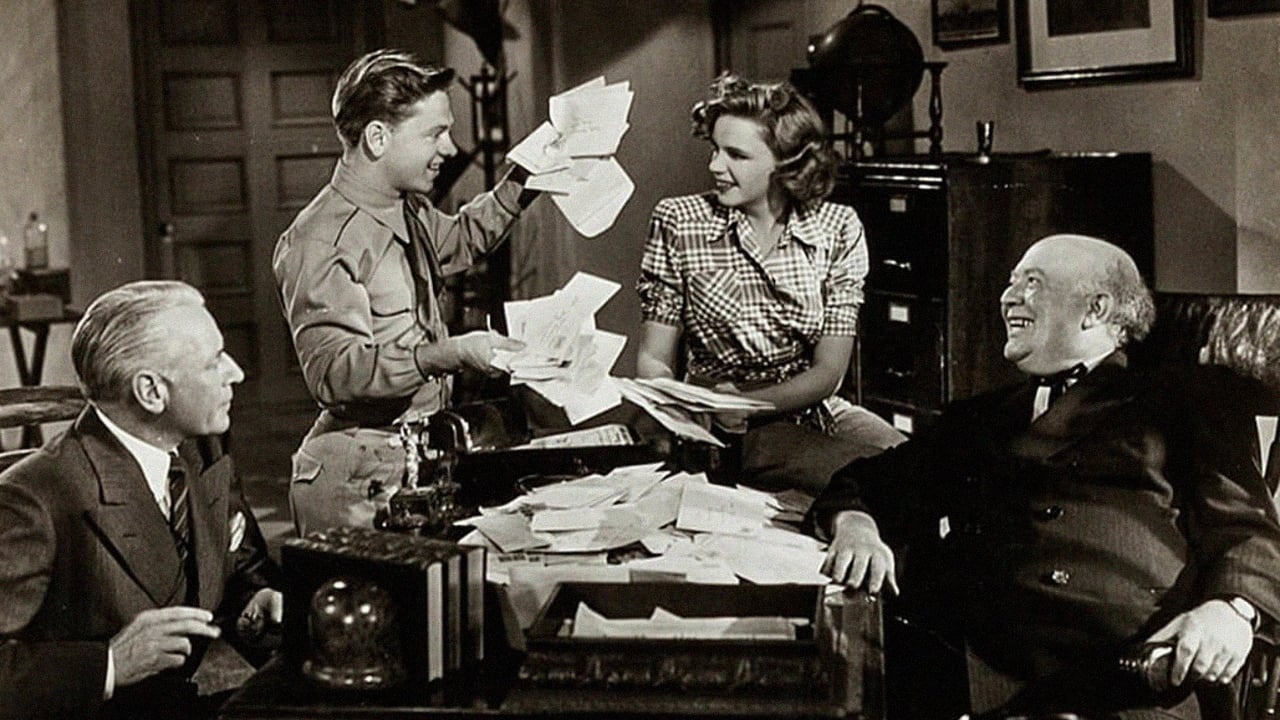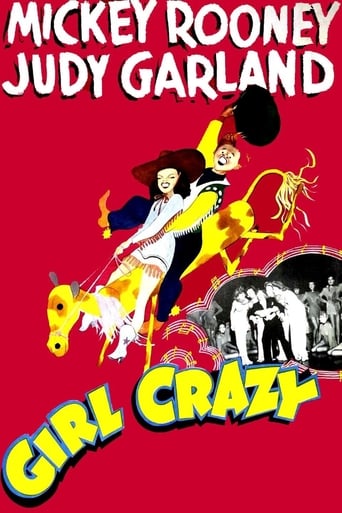

Filled with Gershwin tunes like "Embraceable You" and "I've Got Rhythm", it stars Judy Garland and Mickey Rooney in one of their many enjoyable pairings. The cast also includes June Allyson (who sings at the beginning, then disappears), TV's Nancy Walker (a humorous role, naturally), Guy Kibbee as Garland's grandfather, and Tommy Dorsey (as himself). This is a fairly good musical with an uncommon setting, out West in the desert with cowboys, but no Indians (well, two, very briefly). Rags Ragland also appears as a significant character in the film; Garland sings him to tears with the melancholy "But Not For Me" near the movie's end.Rooney is playboy who's embarrassed his well-known publisher father for the last time. Father (Henry O'Neill) sends Rooney to a men's college (run by Kibbee's character) in the middle of nowhere to straighten him out. There, he meets Garland, the only woman around these parts, right away. Predictable jokes are played on the "city boy" by the locals and, of course, eventually Rooney wins over Garland. The two then work to "save" the college, whose enrollment is down, with a Wild West Rodeo show and beauty contest. A love interest conflict, the Governor's daughter (Frances Rafferty), for Rooney is introduced to make things interesting until the film ends with the aforementioned show.Irving Bacon appears, uncredited, as the Governor's assistant. Peter Lawford and Don Taylor appear, uncredited, as two of the students.Directed by Norman Taurog (Skippy (1931)), with a screenplay by Fred Finklehoffe (Meet Me in St. Louis (1944)).
... View MoreMickey Rooney (Danny) is a college playboy – God knows how – and is sent to a rural college by his dad where there are no women students enrolled. What a totally stupid college. Anyway, there is one woman there – Judy Garland (Ginger), daughter of Guy Kibbee (the Dean) and she is responsible for the mail that comes into and out of the town via the railway station in the middle of nowhere. Does Mickey Rooney continue his lucky run with the ladies? Guess who he sets his sights on? This story of this film is irrelevant. Basically, Garland and Rooney meet up, sing songs, dance and put on a show. Apparently, this is viewed as the best of their collaborations so I'm glad I watched it. It saves me from what must be total dross in their other offerings. Both Garland and Rooney are larger than life personalities with one difference – Garland is likable whilst Rooney is detestable. I've even read that he plays down his usual energy-bomb character in this film. Good God! If this is him calmed down, I want no further interactions with this ghastly pipsqueak.All the characters are awful – even Judy Garland is particularly unpleasant on first meeting Rooney and leaving him stranded. However, what we do get is the talent of Judy Garland and the music. She is, of course, a great singer and this makes the film almost passable. The best song is "Bidin' My Time" near the beginning of the film. Nothing else is particularly memorable on the song front but Garland delivers them well. By contrast, Rooney's shtick is unbearable and the scene where he just keeps mimicking radio commentaries is agonizing. Not funny. Ever.A film with screen legends but you can skip it. Like I said – "Bidin' My Time" is the only reason to watch this film. Judy's performance during this is classic stuff.
... View MoreIn more or less following the plot of the '30 Broadway show and '32 film, the plot of this 4th and last of the Mickey & Judy musical film series departs somewhat from the previous 3. Instead of being small town high schoolers trying to get started in a musical or theatrical career, Mickey is the spoiled playboy son of a wealthy NYC publisher, and Judy has a postmaster job at a tiny, very isolated, all men cow college(Cody), presumably in Wyoming, where Mickey is sent to get him away from the distractions(especially girls) of NYC, and build his character.Remember, this is 1943: the midst of WWII. Unlike the '41 "Babes on Broadway", there is no reference to the war. However, Mickey's situation at Cody College is somewhat like that of most servicemen. Like them, he is suddenly thrust into an unfamiliar social and physical environment where opportunities to romance single women are sparse, and he can't rely on his father to bail him out of trouble. Although he almost throws in the towel after his first few days, eventually, he takes on the seemingly impossible challenge of saving the college from being shut down for lack of enrollment, which is somewhat analogous to the role of servicemen in helping the US from being overwhelmed by the Nazis and Japan. He does this by promoting a Cody rodeo and 'rodeo queen' contest. Mickey proposes that this become an annual event. Presumably, in the future, the queen has to be a student at Cody, precipitating an influx of entrance applications from girls, assuming that the college will be declared co-ed in the future.... One possible indirect reference to the war is when M&J are trying to see the governor about their idea, but are told he won't likely have time for them. But, they are moved ahead of all others when the governor is told a Mr. Churchill(Winston?) is there to see him. Yes, corny! While they are waiting to see the governor, Mickey does his classic impression of sports announcers.The film begins with short Mickey in top hat and tails being driven around NYC by two beautiful women, eventually entering Teddy Mitchell's '100 beautiful girls' night club, featuring the Dorsey band. June Allyson does her initial film song on stage: "Treat Me Rough", later displaced by the girl chorus, who eventually pull Mickey to the stage and 'treat him rough', as he gets to sing some too. This is a fun production! ..Later, his father is upset at the newspaper accounts of this episode, and tells him he's being transferred from Yale to obscure Cody College. Mickey is next seen at the tiny Cody rail station, being told the population of Cody is 0, and the college is 8 miles down a dusty road, with no transport. Eventually, he finds Judy on this road trying to fix her car. She's mostly sarcastic at his interest and leaves him in the dust once her violently shaking rattle-trap car is running: quite an amusing scene. Once at the college, Mickey has a rough couple of days, as the students subject him to some initiation rituals and pranks. He's ready to go back to NYC, so Judy gives him a ride to the station, during which they argue, flirt and sing a bit: a good scene!The students put on a big birthday party for Judy, giving her a piano. She plays and sings the memorable "Embraceable You", the men eventually taking over the singing, followed by dancing. For a portion, it looks like Astaire and Rogers dancing. This is the second of 3 big musical productions. The last and much the most elaborate is the Busby Berkeley-directed manic "I Got Rhythm" extravaganza, again including the Dorsey band, with everyone dressed in western garb... In a very strange scene, after the birthday party, Judy strolls with her apparent boyfriend, who asks, in a very formal way, for an engagement. Then, he says he doesn't want to get romantic! After he leaves, Mickey unexpectedly shows up, and they talk about their relationship. After Judy learns that the college is slated to be closed, and after she loses the 'Queen of the Rodeo' contest, she changes from a confident into a weepy woman, who says she's moving east with her visiting cousin(Nancy Walker). But when she learns the college probably will be saved, she perks up, in time for the finale "I Got Rhythm".The governor's daughter(played by Frances Rafferty) serves the role played by June Priesser in "Babes in Arms" and "Strike up the Band", as the debutante that Mickey has to favor for a while over Judy, on the surface, in order to achieve his goal.How Tommy Dorsey came to take his band from NYC to a birthday ball and then rodeo event in this obscure corner of the US is not explored!In contrast to the previous M&J musicals, Mickey looks utterly ridiculous in many scenes: like a kid, getting pushed around by a group of much taller women on stage in NYC, then dressed up as a diminutive cowboy, or lugging his suitcases down a long dusty road in coat and tie. Makes him seem like a Charlie Chaplin-like character, contrasting with his supposed status as a lady's man. No doubt, that's partly why this is considered by many to be the best of the M&J musicals. I still have a slight preference for "Babes on Broadway".Incidentally, Cody WY does host a major annual rodeo event, although there is no college there.This was Judy's last B&W film. June and Nancy, with bit parts, had debuted for MGM earlier in '43 in the Technicolor "Best Foot Forward". Apparently, MGM was relying on star power to sell the present film.
... View MoreA Mickey and Rooney and Judy Garland film is something that is hard to understand today. While I adore classic Hollywood films, there is a certain strangeness about their films together that just falls a bit flat. All the singing, cuteness and formula came off very well back during the late 30s and into the 40s but now it just seems dated. I am not putting the films down--just saying that although they were IMMENSELY popular then, today they are not exactly to most viewers' tastes.This movie is distinguished by having music and lyrics by George and Ira Gershwin. George had unexpectedly died a few years earlier, and these songs were from the stage version of "Girl Crazy" from the 1930s. And while I have enjoyed their music, I wasn't thrilled with some of the musical numbers here--especially since Ira's lyrics were occasionally pretty limp. The worst I can think of is the song which features the immortal line 'I'll tie your shoesies'. In addition, even compared to the typical musical of the day, this one simply had too much music. Unless you adore musicals chock full of singing, this might not be your cup of tea. Plus, hearing June Allyson belting out the opening song was a bit tough on the ears.One interesting point in this otherwise formulaic film is seeing Nancy Walker when she was young. As I grew up seeing her in commercials and on Rhoda, I just assumed she always was old! Here, she plays goofy comic relief.The story begins with Rooney playing a spoiled young playboy. He's not exactly a bad guy--just a bit full of himself. Well, his rich father isn't thrilled to see this and decides to pull him out of Yale and move him to a small western college that is NOT co-ed. Not surprisingly, there is a girl there--the Dean's daughter (Garland) and like was so often the case in this sort of film, they hate each other when they meet. Will they manage to work through this? You betcha. The next hurdle, then, is the school's future. The state is thinking about closing it as enrollment is way down. Guess what Mickey and Judy decide to do..yup, put on a show (which, incidentally, they did in 1840249 other films)! So is this one worth seeing? Well, yes...but only if you haven't watched several other Garland/Rooney films or if you like their films so much that you want to see them all. As for me, a classic movie fiend who isn't enamored with their films together, this and "Babes in Arms" and a few others I've seen are enough for me for the time being. Otherwise, they all start to look pretty much alike.
... View More